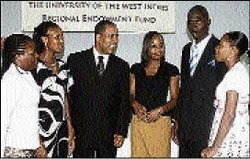
Contributed
UWI, Mona, principal, Professor Gordon Shirley (third from left), congratulates the first recipients of the 2009-2010 UWI Regional Endowment Fund (UWIREF) Full Scholarships (from left) Anne-Teresa Birthwright, Mele-a Campbell, Felisha Henry, Amoako Evans and Shanique Sterling. The UWIREF provides the opportunity for international and regional donors to collaborate with the university to give meaningful support to its undergraduate and graduate students, research and other developmental projects. The 2009-2010 UWIREF scholarships were funded through the collaborative efforts of UWI and its partners including RBTT, Sir George and Lady Sylvan Alleyne, Dame Bernice Lake, Maud Fuller, the late Roydell Lawrence and late Professor Pamela Rodgers-Johnson. Partial scholarships have also been awarded to Adrian Stephens, Pettia-Gay Williams, Shaneek Findlay and Samantha-Kaye Christie.
One of the major challenges facing educators at the primary level is the lack of consensus among parents and teachers as to the approach that should be taken in covering the curriculum at that stage in a child's life. This means that even teachers within the same school may approach teaching and learning in different ways even though the children sit common examinations such as the Grade Three Diagnostic Test, Grade Four Literacy Test and the Grade Six Achievement Test (GSAT).
In 2004, the Government of Jamaica, in recognition of the differences in teaching and learning of students on the tests, commissioned a task force to examine primary education. They recommended that the existing curriculum be supported by standards in an effort to ensure that all primary school teachers deliver common content and utilise similar teaching and assessment methods.
Data gathering
The examination was done by Dr Josett Lewis Smikle, Lecturer in Language Education (Literacy Studies), and Dr Paula Daley-Morris, Lecturer in Teaching, Learning and Curriculum, both of the Department of Educational Studies, at the UWI, Mona. The researchers went across the length and breadth of Jamaica and spoke with hundreds of teachers, parents, students and other Jamaicans about their use and understanding of the Revised Primary Curriculum (RPC). They also asked about expectations for primary schooling in Jamaica.
After about six months of data-gathering and analysis, the researchers used the findings to develop National Curriculum Standards - broad goals for education in Jamaica as well as learning and assessment standards to drive the academic progress and achievement of students. These standards were shared with the relevant education officers and their feedback informed the final standards which should guide education at all levels in Jamaica. The researchers also recommended that a set of standards be developed to guide teaching at the primary level of schooling.
Primary standards
The National Curriculum Standards, prepared by the researchers, were used to guide the development of general primary standards for all subjects, including music, drama, visual art, physical education, religious education and the traditional disciplines. These general primary subject standards were used to reshape the attainment targets in the RPC to form specific standards for all subjects.
As a result of the work produced by these researchers, it is now possible to develop standards-driven curricula across Jamaica. Hereafter, parents and teachers should not differ in their understanding of what is expected of the curriculum in primary schools. All teachers across Jamaica are now able to approach teaching and learning in comparable ways and students who are sitting common examinations such as the Grade Three Diagnostic Test, the Grade Four Literacy Test and the Grade Six Achievement Test (GSAT) can be prepared in a similar manner.
The University of the West Indies (UWI), Mona will begin offering a programme of study leading to a Bachelor of Science (BSc) degree in electronics engineering effective September 2009. The programme will be offered through the Electronics Unit of the Faculty of Pure and Applied Sciences at Mona.
Additional programmes including renewable energy, energy management and engineering and biomedical engineering are expected to come on-stream in 2010. Preparation of Jamaican students for advanced placement in traditional engineering programmes, i.e., power engineering, civil engineering and mechanical engineering will be also facilitated at the Mona campus.
Discussions
The new programmes are being introduced as part of a decision to expand The UWI's engineering programmes to other UWI campuses starting with the Mona campus in Jamaica based on an increased demand for an engineering presence at Mona. The expansion follows on discussions with the Jamaican Institute of Engineers, the conduct of a needs survey and the university's examination of the Government of Jamaica's April 2009 document on critical skills needs in the public sector. This analysis led to the conclusion that apart from the need for traditional engineering areas such as civil engineering and electronics engineering, there is also a demand for emerging disciplines such as biomedical engineering, environmental engineering and energy engineering which are currently underserved.
The university has noted with deep concern the declining numbers of Jamaicans enrolled in the engineering programme at its St Augustine campus in Trinidad and Tobago. In 2007/2008, the undergraduate enrolment at the Faculty of Engineering was 1,419 with only 53 of these being Jamaican students. Only 12 new Jamaican students were registered in 2007. This suggests that St Augustine is not seen as an effective option for Jamaican students seeking tertiary engineering education.
Quality programmes
The Mona campus already has a foundation for supporting quality programmes in engineering. This includes at least three PhD qualified electronic engineers on staff in its Physics Department which will be restructured to provide the space for running a quality programme in engineering. UWI, Mona also has a dedicated Electronics Unit that has served the country for years, and an Energy Conservation Unit which has accumulated considerable expertise in energy conservation technologies. The campus also has a chemical engineering potential in the Department of Chemistry.